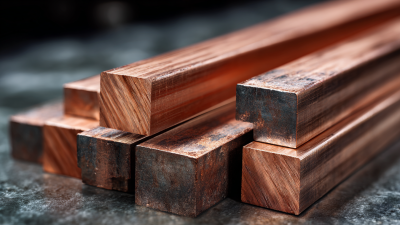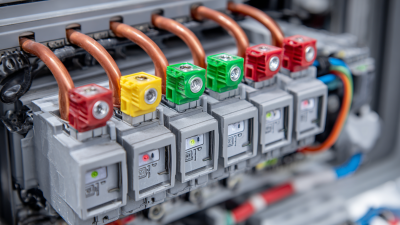How to Choose the Right Epoxy Fiberglass Sheets for Your Project
Table of Contents
- Understanding the Different Types of Epoxy Fiberglass Sheets Available
- Key Factors to Consider When Selecting Epoxy Fiberglass Sheets
- Evaluating the Mechanical Properties for Your Specific Application
- Assessing Temperature and Chemical Resistance for Durability
- Cost Considerations: Balancing Quality and Budget for Epoxy Sheets
- FAQS
- Conclusion
- Related Posts
So, if you're diving into a project that calls for sturdy and reliable materials, it's pretty important to know how to pick the right epoxy fiberglass sheets. These things are pretty impressive—they’re great at insulating electrically and are super strong mechanically, which is why they’re often used in all sorts of stuff, from electrical parts to structural elements.
 At Sichuan D&F Electric Co., Ltd., we’ve been around since 2005 and are based in Deyang, Sichuan, China. We take pride in being a trusted name when it comes to making and supplying electrical connection components and insulation parts. With all our industry experience, we’re ready to share some insights on how to pick the best epoxy fiberglass sheets for your project. Whether you’re worried about heat resistance, durability, or electrical stuff, knowing what to look for can really make a difference in how well your project turns out.
At Sichuan D&F Electric Co., Ltd., we’ve been around since 2005 and are based in Deyang, Sichuan, China. We take pride in being a trusted name when it comes to making and supplying electrical connection components and insulation parts. With all our industry experience, we’re ready to share some insights on how to pick the best epoxy fiberglass sheets for your project. Whether you’re worried about heat resistance, durability, or electrical stuff, knowing what to look for can really make a difference in how well your project turns out.
Understanding the Different Types of Epoxy Fiberglass Sheets Available
When you're trying to pick the right epoxy fiberglass sheets for your project, it's pretty important to get a good grip on the different types out there. You’ve got your main players like E-Glass, ECR Glass, and S-Glass. E-Glass, which is often called electrical glass, is super popular because of its great insulating properties and works well for most everyday uses. Then there’s ECR Glass — that’s a mix of E-Glass and some corrosion-resistant stuff — making it perfect if you’re dealing with harsh chemicals or tricky environments. And S-Glass, the heavyweight of the bunch, is known for being incredibly strong and able to handle high temperatures. You’ll often see it in aerospace or military stuff where durability is a must.
Market trends show that the fiberglass scene is on the rise, with lots of industries pinning their hopes on it. Recent industry reports say E-Glass pretty much leads the pack, making up around 60% of what’s used because it’s versatile and budget-friendly. At the same time, newer tech has pushed up demand for S-Glass, especially in aerospace, where saving weight and keeping things sturdy is a big deal. Knowing these differences can really help you choose the right material based on what your project needs — making sure you’re making an informed choice, rather than just guessing.
Key Factors to Consider When Selecting Epoxy Fiberglass Sheets
When you're choosing epoxy fiberglass sheets for your project, there’s quite a few things you want to keep in mind. First off, think about how thick the sheet is. Usually, thicker sheets tend to be stronger and more durable—which makes them great if you're working on something structural. On the flip side, thinner sheets are more flexible and often better suited for decorative or light-use stuff. Basically, you want to pick what's best based on what your project actually needs.
Another important thing is the type of epoxy resin in the sheets. Different resins come with different perks—like heat resistance, chemical resistance, and overall toughness. So, if your project’s going to be exposed to high temperatures, it’s a smart idea to go for a high-temperature epoxy. That way, you’re making sure everything holds up and lasts.
Quick tip: Always take a look at the manufacturer’s specs before you buy. They give you good info about where the sheets can be used and what their limitations are. Oh, and don’t forget to think about the weight—if you’re planning to use these sheets in something lightweight or portable, a heavier option might be stronger but could also be a pain to handle or move around.

Evaluating the Mechanical Properties for Your Specific Application
When you're choosing epoxy fiberglass sheets for a particular project, it’s really important to pay attention to their mechanical properties. Stuff like tensile strength, flexural strength, and impact resistance are key because they tell you how the material will hold up under stress. For example, if you’re working on something that needs to support heavy loads—like structural parts in building projects—you’ll want sheets with strong tensile strength. It’s a good idea to think about how much weight or stress your application will encounter, just to make sure the material can handle it without any surprises.
Also, don’t forget about other important factors like thermal stability and moisture resistance. If your project is going to be in the heat or humidity—say outdoors or in humid environments—you’ll need a fiberglass sheet that keeps its shape and strength despite those conditions. Picking a product with good thermal expansion properties can save you from warping down the line. And if you're working on something more specialized, like in marine or aerospace fields, it’s worth considering additional stuff like fatigue resistance and how it reacts with chemicals. By really digging into these mechanical details, you’ll be able to pick the perfect material that matches your project’s specific needs and makes everything run smoothly.

Assessing Temperature and Chemical Resistance for Durability
When you're choosing epoxy fiberglass sheets for your project, it's really important to think about how they'll handle heat and chemicals. These factors play a big role in how long the material will last and perform well over time. High-quality epoxy fiberglass can take on quite a bit of heat and tough chemicals, making it versatile for all sorts of uses — whether that's in cars, boats, or pretty much anywhere harsh conditions are involved. So, understanding your working environment and picking sheets that match those conditions is key to making sure everything works smoothly and safely.
Here's a handy tip: pay attention to the maximum temperature the sheets can handle. Make sure to check the specs for temperature limits, especially if your project involves exposure to heat. Also, consider what kind of chemicals they'll be up against — some epoxy fiberglass types resist acids and solvents better than others. Doing some thorough research and chatting with manufacturers can really help you find the right fit.
And don’t forget, testing out a few samples or consulting with experts can give you a better idea of how they'll perform under actual conditions. Plus, adding extra layers or special treatments can boost their resistance, so if you’re working on something critical, it might be worth looking into those options to boost durability.
Cost Considerations: Balancing Quality and Budget for Epoxy Sheets
When you're picking out epoxy fiberglass sheets for your projects, it’s really about finding that sweet spot between quality and what you’re willing to spend. Good materials aren’t just about durability and performance—they can actually make your project last longer in the long run. But let’s be honest, with costs climbing for pretty much everything, it’s more important than ever to make smart budget choices. The key is to think about what your project really needs—like strength, insulation, or how well it handles tough conditions—and then compare prices from different suppliers to see what fits best.
At Sichuan D&F Electric Co., Ltd., they stress how important it is to source reliable, top-quality electrical parts, including those epoxy fiberglass sheets. Yeah, it might mean spending a bit more upfront, but in the end, it often saves you money because you’ll spend less on repairs and replacements down the line. Now, I get it—cheaper options can look tempting at first, but they might end up costing you more in the long run if they don’t perform the way you expect. So, understanding the balance between cost and quality really helps you make smarter choices and avoid headaches later on.
FAQS
: The main types of epoxy fiberglass sheets are E-Glass, ECR Glass, and S-Glass. E-Glass is widely used for general applications due to its excellent insulation properties, ECR Glass offers high chemical resistance, and S-Glass is preferred for demanding aerospace and military applications due to its superior strength.
E-Glass dominates the market, accounting for approximately 60% of consumption because of its versatility and cost-effectiveness.
Mechanical properties such as tensile strength, flexural strength, and impact resistance directly influence a material’s performance under stress. For projects requiring high load-bearing capabilities, sheets with superior tensile strength are recommended.
In addition to strength metrics, consider thermal stability and moisture resistance. Applications in varying temperatures or humid environments may require sheets that maintain integrity under such conditions.
Temperature resistance is important because it determines how well the sheets will perform in applications exposed to heat. Selecting sheets with specified temperature limits ensures performance and safety in applications prone to heat exposure.
Chemical resistance impacts the durability of epoxy fiberglass sheets as different materials can withstand varying levels of exposure to acids, solvents, and corrosive substances. Choosing the right type ensures the sheets remain intact in challenging environments.
Extra layers or treatments can enhance the resistance properties. Exploring these options is beneficial for critical projects where durability is paramount.
Conducting a thorough analysis of the application requirements, testing samples, and consulting with professionals can provide insights into how well the selected sheets will hold up under stress.
Increasing demand in diverse industries, particularly aerospace and marine sectors, is driving the need for high-performance materials like S-Glass and ECR Glass, due to their specialized properties and applications.
For specialized uses, such as in marine or aerospace applications, evaluate factors like fatigue resistance, chemical compatibility, and specific mechanical properties required for the project.
Conclusion
When you're trying to pick out the right Epoxy Fiberglass Sheets for your project, it’s really important to understand the different kinds you can find out there. Honestly, things like the mechanical strength you need, along with how well the material stands up to heat and chemicals, really matter if you want something long-lasting. At Sichuan D&F Electric Co., Ltd., we’re more than just a manufacturer and supplier of electrical insulation parts — we get that finding the right balance between quality and cost is crucial. If you take the time to weigh all these factors carefully, you’ll be able to choose a product that hits your performance goals without breaking the bank. It’s all about making smart, informed decisions that work for your project’s needs and your budget.
Related Posts
-

5 Reasons Why 3240 Epoxy Board is the Best Choice for Your Projects
-

The Future of Innovation in the Copper Aluminum Busbar Market
-

Ultimate Guide to Choosing the Right Flexible Busbar Connectors for Your Systems
-

Mastering Gpo3 Material with These Essential Digital Strategies
-

How to Choose the Right China Wholesale Battery Pack for Your Business Needs
-

Exploring the Unique Properties and Applications of Best Nomex T410 Film: A Comprehensive Guide for Buyers









